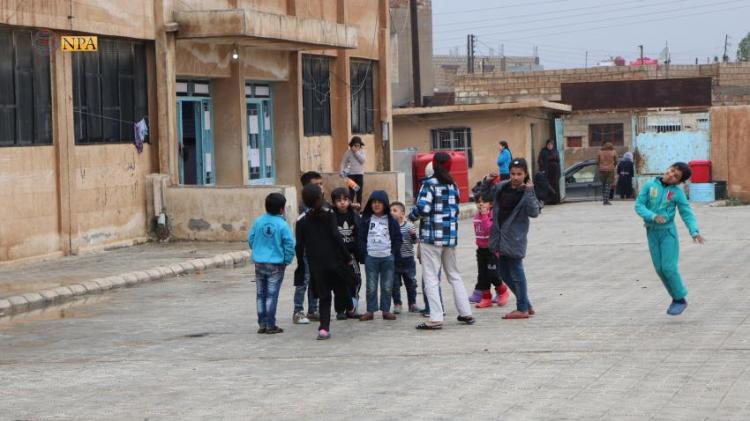Difficulties facing the educational sector in Hasakah after turning schools into shelters for IDPs
Hasakah- North-Press Agency
Delsoz Youssef – Jindar Abdulqader
With the start of the new school year 2019-2020, the education sector in the city of Hasakah, in north-eastern Syria, faces many challenges and difficulties in light of turning dozens of schools into shelters for the displaced people from the ongoing Turkish military invasion in the region, amid a disparity in the numbers of students after most families refrained from sending their children to travel long distances to reach the nearest schools.
The Turkish military and its affiliated armed groups’ invasion in the areas of Sere-Kaniye (Ras al-Ain) and Tal Abyad (Gre-Spi), that started in October, cast a shadow over the course of the educational process for the new academic year in Hasakah governorate. As schools have become shelters for children and their families and places to learn at the same time, leaving the hopes of saving the school year for thousands of students subject to the security situation in the region, to return the displaced people into their homes, or finding quick solutions to provide shelters for families living inside schools.
The Education Authority of the Autonomous Administration of N Syria has witnessed a decline in the numbers of students unlike the previous years, as it opened the doors of schools in the city of Hasakah at the beginning of this week, where students of several schools were combined into one school to fill the vacancies in classes. In this context, after merging the schools of (Marwan Youssef and Hamid Mahfouz), the administrative Ahin Muhammad told North-Press, that most of the schools in the region are inhabited by the displaced people from Ras Al-Ain and its countryside, "which negatively affected the new school year," explaining that the decrease in the number of students is due to the long distance the student will take to reach the nearest school, especially with the advent of winter.
Time is divided into three stages
Ms. Muhammad noted they divided the school day into three stages, starting from 08:00 a.m. until 03:00 p.m., in order to receive a good number of students, "at the rate of two and a half hours per session, after removing the entertainment classes from the curriculum and only focusing on scientific subjects," according to Muhammad.
Regarding the displaced children, Ahin Muhammad explained that they receive the displaced students who reside close to the nearest school. In spite of being housed inside the schools to escape the war, the students' families are asking the concerned authorities to find solutions to educate their children.
As Samra al-Aliyat, a displaced woman from the countryside of Abu Rasin (Zargan), north-west of Hasakah, and lives in a school with her six children and her husband, said: "We were displaced out of war and fear, our children are sitting in classes as IDPs instead of receiving their education," noting that 4 of her children are at elementary grade.
66 schools for the displaced people
Commenting on the topic, the administrator of the Schools Board Azad Mahmoud in Hasakah region (an administrative division that includes the city of Hasakah up to the city of Ras al-Ain on the Syrian-Turkish border), noted that since the beginning of the Turkish military and its affiliated armed groups’ attacks on the region, "the educational sector has been severely damaged. In the city of Hasakah, about 66 schools have turned into shelters for the displaced people, which has moved many students away from education," he said.
According to Mahmoud, there are between 5-6 schools in every district in Hasakah, but they only devoted one of them for education. "The students whose houses are far from schools drop out of their studies, which increases the difficulty of the educational process this year," he added.
Regarding the displaced students, Mahmoud said: "We have tried hard to teach children within the schools where the displaced families are, but we are facing challenges in this regard, while we are currently planning to open tents for teaching the IDPs in Washo-Kani camp, in the city's countryside."
He also stressed that they are discussing laying rapid plans to educate all deprived students, but these plans face great challenges because of winter season, in addition to the absence of an alternative shelter for the displaced people to get them out of schools.

